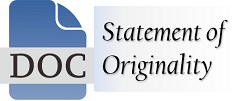Inovasi Organisasi Saat Pandemi COVID-19 di Universitas Bhayangkara Jakarta Raya
DOI:
https://doi.org/10.31599/jki.v1i1.275Keywords:
Organizational Culture, Leadership Style, Pandemic COVID-19, Organizational InnovationAbstract
The condition of the COVID-19 pandemic, which spread throughout the world, caused a massive economic downturn. The importance of education and training patterns that provide results that can be applied in the real world is the main target of education. Innovation leadership, both directly and through increasing strategic compatibility, significantly improves company performance. This study aims to examine the relationship between organizational culture, leadership style, and organizational innovation mediated by the COVID-19 pandemic. Research respondents are lecturers, and employees and students involved in student organizations. The results showed that the Organization Culture and Leadership Style mediated by the condition of Pademi Covid-19 there was a significant relationship to the Innovation Organization
Keywords: Organizational Culture, Leadership Style, Pandemic COVID-19, Organizational Innovation
Abstrak
Kondisi pandemic COVID-19 yang menyebar di seluruh dunia, menyebabkan kemerosotan ekonomi secara massif. Pentingnya pola pendidikan dan pelatihan yang memberi hasil yang dapat diaplikasikan dalam dunia nyata merupakan target utama pendidikan. Kepemimpinan inovasi, baik secara langsung maupun melalui peningkatan kecocokan strategis, secara signifikan meningkatkan kinerja perusahaan. Penelitian ini bertujuan menguji hubungan antara budaya organisasi, gaya kepemimpinan, dan inovasi organisasi yang dimediasi pandemi COVID-19. Responden penelitian merupakan dosen dan karyawan serta mahasiswa yang terlibat dalam organisasi kemahasiswaan. Hasil penelitian menunjukan bahwa Organization Culture dan Leadership Style dimediasi oleh kondisi Pademi Covid-19 ada hubungan signifikan terhadap Innovation Organization.
Kata kunci: Budaya Organisasi, Gaya Kepemimpinan, Pandemi COVID-19, Inovasi Organisasi
Downloads
References
Alcadipani, R. (2020). Pandemic and Macho Organizations: Wakeup Call or Business as Usual? Gender, Work & Organization.
Carmeli, A., Gelbard, R., & Gefen, D. (2010). The importance of innovation leadership in cultivating strategic fit and enhancing firm performance. Leadership Quarterly, 21(3), 339–349. https://doi.org/10.1016/j.leaqua.2010.03.001
Craighead, C. W., Ketchen Jr, D. J., & Darby, J. L. (2020). Pandemics and Supply Chain Management Research: Toward a Theoretical Toolbox. Decision Sciences.
Feher, C., & de Bidegain, I. (2020). Pension Schemes in the COVID-19 Crisis: Impacts and Policy Considerations.
Golmoradi, R., & Ardabili, F. S. (2016). The Effects of Social Capital and Leadership Styles on Organizational Learning. Procedia - Social and Behavioral Sciences, 230(May), 372–378. https://doi.org/10.1016/j.sbspro.2016.09.047
Hair Jr, J. F., Howard, M. C., & Nitzl, C. (2020). Assessing measurement model quality in PLS-SEM using confirmatory composite analysis. Journal of Business Research, 109, 101–110.
McDonough III, E. F. (2000). Investigation of factors contributing to the success of cross-functional teams. Journal of Product Innovation Management: An International Publication of the Product Development & Management Association, 17(3), 221–235.
Raj, S., Nijjer, S., Ongsakul, V., & Singh, H. (2019). Determinants of key facets of job satisfaction in the banking sector: applying SMART PLS and artificial neural networks. Journal for Global Business Advancement, 12(2), 298–323.
Sarstedt, M., & Cheah, J.-H. (2019). Partial least squares structural equation modeling using SmartPLS: a software review. Journal of Marketing Analytics, 7(3), 196–202.
Shulhan, M. (2019). Effect of Authentic Leadership on Academic Atmosphere and Organizational Culture in Indonesian Islamic Higher Education. International Journal of Innovation, Creativity and Change, 7(2).
Szczepańska-Woszczyna, K. (2015). Leadership and Organizational Culture as the Normative Influence of Top Management on Employee’s Behaviour in the Innovation Process. Procedia Economics and Finance, 34(15), 396–402. https://doi.org/10.1016/s2212-5671(15)01646-9












_-_Copy1.jpg)




